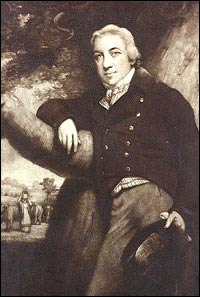Edward Jenner Biography
Edward Jenner (17 May 1749 – 26 January 1823) was an English doctor who popularised a vaccination for smallpox and became the father of immunology.
Short Bio Edward Jenner
Edward Jenner was born in Berkeley, Gloucestershire on 18th May 1749. The son of a local vicar he was interested in natural history and medicine from an early age. Aged 14, he began his training to be a doctor in Chipping Sodbury, Gloucestershire before completing his training in London. He studied at St George’s Hospital under surgeon John Hunter and was influenced by his philosophy of seeking new discoveries – “Don’t Think, try”
In 1773, Jenner returned to his native Berkeley to become a general practitioner. In his spare time, he pursued his study of native wildlife and also new developments in medical science.
Jenner and Vaccine for Small Pox
At the time, one of the most feared diseases was smallpox. The disease was common and killed up to 33% of those who contacted it. At the time, there was little known treatments or vaccinations that could prevent it.
 Jenner was interested in the observation that milkmaids who were in close contact with cows, very rarely contacted the disease. With this revelation, Jenner was interested in testing a theory that inoculating humans with a strain of the cowpox virus could protect them from smallpox through the immunity from the similar, but much less dangerous, cowpox strain.
Jenner was interested in the observation that milkmaids who were in close contact with cows, very rarely contacted the disease. With this revelation, Jenner was interested in testing a theory that inoculating humans with a strain of the cowpox virus could protect them from smallpox through the immunity from the similar, but much less dangerous, cowpox strain.
This practise of using a cowpox virus had been tried on odd occasions before, for example farmers such as Benjamin Jesty had deliberately arranged cowpox infection for their family. However, these unofficial tests had not proved anything to a sceptical medical scientific community.
In 1796, Jenner tested his theory by inoculating James Phipps, a young boy of 8 with cowpox blisters from the hand of a milkmaid who had caught cowpox. The young, James, contacted a mild fever, but, to Jenner’s relief, when he gave James Phipps variolous material, he proved resistant to this mild form of small pox. He wrote in 1801
‘It now becomes too manifest to admit of controversy, that the annihilation of the Small Pox, the most dreadful scourge of the human species, must be the final result of this practice (BBC Smallpox)
To Jenner, this immunity to Variolation was proof that the cowpox inoculation gave immunity from smallpox. Thus, Jenner had provided a relatively safe way to immunise people from the deadly smallpox virus.
“The joy I felt as the prospect before me of being the instrument destined to take away from the world one of its greatest calamities (smallpox) was so excessive that I found myself in a kind of reverie”
– Edward Jenner
Jenner went on to test in theory on a further 23 subjects – all of which gave the same results. After some delay, his research was published by the Royal Society to a mixture of scepticism and interest. After this, Jenner gave up his medical practise and devoted himself full time to immunisation work. He was given a grant from Parliament to support him in his work. This involved setting up the Jennerian Institution a society concerned with promoting vaccination to eradicate smallpox.
This would eventually be successful, in 1840, 17 years after Jenner’s death, the British government, in an act of Parliament, banned the use of variolation and provided the cowpox inoculation free of charge. By 1979, the World Health Organisation (WHO) had declared smallpox extinct – a remarkable achievement of which Jenner’s ground-breaking work on immunisation played a key role.
His reputation led to his appointment as a physician extraordinary to King George IV and was made a Justice of the Peace.
He died in January 25 1823, after a stroke from which he never recovered.
It is said, through his work on vaccinations, Jenner saved the lives of more people than anyone else.
No comments:
Post a Comment